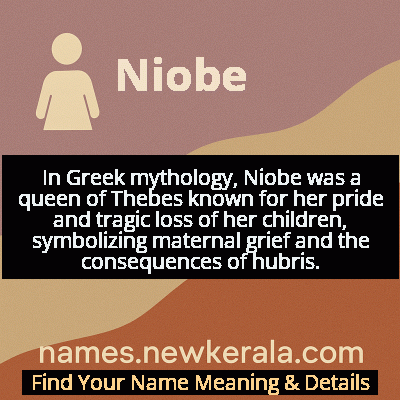Niobe Name Meaning & Details
Origin, Popularity, Numerology Analysis & Name Meaning of Niobe
Discover the origin, meaning, and cultural significance of the name NIOBE. Delve into its historical roots and explore the lasting impact it has had on communities and traditions.
Name
Niobe
Gender
Female
Origin
Greek
Lucky Number
9
Meaning of the Name - Niobe
In Greek mythology, Niobe was a queen of Thebes known for her pride and tragic loss of her children, symbolizing maternal grief and the consequences of hubris.
Niobe - Complete Numerology Analysis
Your Numerology Number
Based on Pythagorean Numerology System
Ruling Planet
Mars
Positive Nature
Generous, passionate, energetic, and humanitarian.
Negative Traits
Impulsive, impatient, moody, and can be overly emotional.
Lucky Colours
Red, maroon, scarlet.
Lucky Days
Tuesday.
Lucky Stones
Red coral, garnet.
Harmony Numbers
1, 2, 3, 6.
Best Suited Professions
Military, sports, philanthropy, leadership roles.
What People Like About You
Courage, energy, leadership, generosity.
Famous People Named Niobe
Niobe
Mythological Queen
Central figure in Greek mythology representing maternal grief
Niobe Way
Psychologist and Author
Renowned developmental psychologist and NYU professor
Niobe Thompson
Anthropologist and Filmmaker
Award-winning documentary filmmaker and anthropologist
Name Variations & International Equivalents
Click on blue names to explore their detailed meanings. Gray names with will be available soon.
Cultural & Historical Significance
Extended Personality Analysis
The name Niobe evokes a complex personality profile characterized by deep emotional intensity and strong protective instincts. Those bearing this name often display a natural elegance and dignity that commands respect, combined with a passionate nature that feels emotions with remarkable depth. Their maternal or nurturing qualities are typically pronounced, whether expressed through actual parenting or in their broader relationships and care for others. However, the mythological legacy also suggests potential challenges with pride and the need to balance confidence with humility. Niobes tend to be highly resilient individuals who can withstand significant emotional turmoil, often emerging stronger from adversity. They frequently possess artistic sensibilities and creative talents, with an appreciation for beauty and drama in various forms. Their loyalty to family and principles is absolute, though they may struggle with vulnerability and expressing softer emotions beyond their controlled exterior. The combination of strength and sensitivity makes them compelling, multifaceted individuals who leave lasting impressions on those they encounter.
Modern Usage & Popularity
In contemporary naming practices, Niobe occupies a unique niche as a mythological name that has avoided both obscurity and overpopularization. Current usage trends show it appearing primarily among educated, culturally-aware parents who appreciate classical references but seek distinctive names outside the mainstream. While never breaking into popular name charts—typically ranking outside the top 5000 in the United States—its usage has remained consistent, with slight increases following cultural exposures like The Matrix films. The name appeals particularly to parents interested in strong female names with historical depth and emotional resonance. Modern bearers often report that the name shapes their identity, fostering an interest in literature, history, or the arts. In professional contexts, the name's rarity makes it memorable, while its classical roots lend an air of sophistication. Current demographic data suggests Niobe is most commonly used in academic and artistic communities, with growing interest among parents seeking powerful mythological names that haven't been overused like Athena or Diana.
Symbolic & Spiritual Meanings
Symbolically, Niobe represents one of mythology's most powerful metaphors for transformative grief and the enduring nature of maternal love. The weeping stone imagery symbolizes how profound sorrow can fundamentally alter one's being while maintaining the essence of identity—the stone continues to 'weep' just as the grieving mother continues to love. This transformation speaks to the human capacity to endure unimaginable pain while preserving core aspects of self. The fern symbolism (from the name's potential botanical meaning) adds layers of natural resilience, as ferns thrive in challenging environments and represent new life emerging from difficult conditions. In psychological symbolism, Niobe embodies the concept of 'post-traumatic growth,' where individuals develop greater strength and depth following tragedy. The name also carries warnings about the dangers of excessive pride and the importance of humility before forces greater than oneself. In literary and artistic traditions, Niobe has become shorthand for eternal mourning and the idea that some experiences are so transformative they become integral to one's identity forever.

